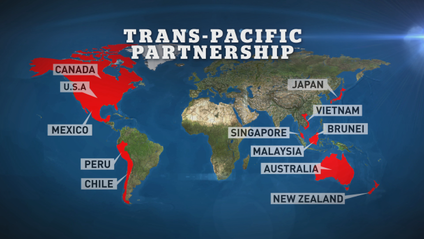
For a chilling view of Canada’s possible future, look no farther than the shamelessly brazen, $15-billion lawsuit that TransCanada Corporation launched against the United States government, after President Barack Obama had the temerity to refuse a permit for the company’s controversial Keystone XL pipeline.
Under the proposed Trans-Pacific Partnership (TPP), now the subject of consultations by Global Affairs Canada, this kind of challenge could become business as usual, anytime a participating government dares turn down an investment proposal or enact a law that a foreign company thinks might interfere with its potential profits.
Democracy? Sovereignty? Not so much.
By their very design, the Investor State Dispute Settlement (ISDS) mechanisms in standard trade deals—from the TPP to the North American Free Trade Agreement (NAFTA)—lay waste to the issues that matter most to Sierra Club Canada Foundation members, and to the wildlife and wild places we hold dear.
Will Canada Ratify the TPP?
International Trade Minister Chrystia Freeland has already signed the massive, 12-country TPP, with repeated assurances that a signing ceremony doesn’t oblige Canada to ratify or implement the deal.
Ratification is required within the next two years —which means part of your volunteer time is spoken for until this trade deal is defeated. Judging by Global Affairs’ recent comments on the issue, we’re going to have our hands full.
“With respect to Investor-State Dispute Settlement (ISDS), the TPP will not impair the ability of Canada or its partners to regulate and legislate in areas such as the environment, culture, safety, health, and conservation,” the department stated, responding to a query from a colleague of SCCF volunteer Ken Johnson.
“Our experience under the NAFTA demonstrates that neither our investment protection rules nor the ISDS mechanism constrain any level of government from regulating in the public interest.”
Which doesn’t explain how Ontario was forced to gut the local content provisions for solar and wind farms in its landmark Green Energy Act in 2012, after Japan successfully challenged the plan before the World Trade Organization.
That was a dispute between governments, not a challenge from industry, but the dynamic is the same. When countries sign trade deals, as trade deals are currently defined and drafted, their autonomy diminishes, often at the expense of environmental protection and clean technology development.
‘NAFTA on Steroids’
“Under NAFTA’s ISDS mechanism, 38 challenges have been made against Canada, two-thirds of them involving environment or resources—and $6 billion in potential costs for Canadians remain on the table in unsettled challenges,” writes Johnson, an adjunct professor of epidemiology and public health at the University of Ottawa. “Canada has already lost six of the 13 settled cases, spent at least $57 million in tribunal costs, and paid out more than $170 million in settlements.”
The TPP “is often characterized as NAFTA on steroids,” he adds, “and will double the number of multinational companies with the ability to sue Canadian taxpayers.”
This is a deal that runs 6,000 pages and was developed in complete secrecy, with input from 600 corporate lobbyists but zero representatives of civil society. Even elected Members of Parliament were shut out. And as Johnson writes, “if you’re not at the table, you’re on the menu.”
In the lead-up to the 2015 United Nations climate conference in Paris, European Union diplomats expressed strong interest in excluding climate solutions from the TPP’s investor dispute mechanism. Like many other promising, practical climate solutions, that idea was left out of the final Paris Agreement.
Worst Deal Ever
When a Nobel laureate and former chief economist of the World Bank describes the TPP as the worst trade deal ever negotiated, you’d think a government committed to transparency and consultation would listen. Particularly when that economist refers to Freedland as an “old friend”. And that’s exactly what we heard from Joseph Stiglitz late last month.
"I think what Canada should do is use its influence to begin a renegotiation of TPP to make it an agreement that advances the interests of Canadian citizens and not just the large corporations," he told CBC.
Stiglitz isn’t against liberalized international trade. But he’s convinced the TPP, and other trade deals dating back to NAFTA, are mostly about protecting specific corporate sectors, not citizens.
"It used to be the basic principle was polluter pay," he said. "If you damaged the environment, then you have to pay. Now, if you pass a regulation that restricts ability to pollute or does something about climate change, you could be sued and could pay billions of dollars."
Which brings us back to the Global Affairs Canada consultation. It’s time to get up to speed on this weighty agreement, form your own opinion on it, and share that opinion with the government.
The government has asked for briefs from citizens up until June 30. More information on the process for providing a written submission can be found in the Guide for Submitting Briefs to House of Commons Committees. Written submissions should be emailed to: ciit-tpp-ptp@parl.gc.ca . “The Government of Canada is committed to being transparent, open, and consultative with Canadians on the TPP,” Global Affairs Canada says. Let’s take them at their word and insist they craft a different ending for this story.

